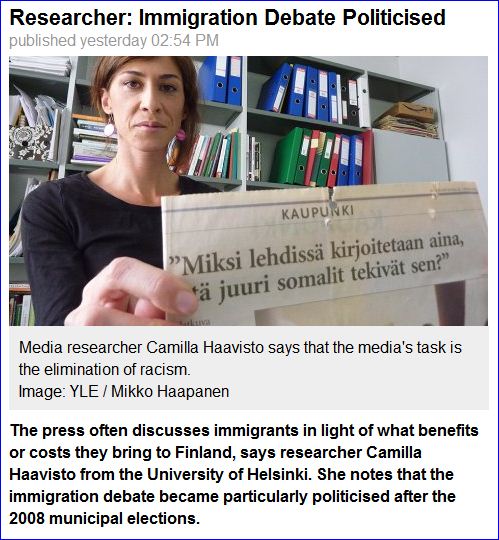Here’s an interesting YLE article that illustrates the depth of disinginuousness within modern day academia and the lack of curiosity within the journalist profession. What in the world do refugees (Finland strictly adheres to EU quotas) have anything to do with an article supposedly centering on research of Finnish attitudes towards immigrants and immigration policies? Let me help you out, nothing at all.
The headline for the article is “Researcher: Immigration Debate Politicized” but the entire article is devoted to how refugees believe that they are being unfairly treated in the media.
Take note that media researcher Camilla Haavisto believes that it’s the “media’s task is the elimination of racism“. Nothing like an academic to show just how much the idea of activist journalism is part and parcel of the thinking in the academy. For Camilla (and for many of her colleagues) the media’s role is not to just report the news, they need to be a heavy politicized entity in order to help further “social justice” in society.
(NOTE: There is absolutely no doubt whatsoever that this woman would completely reject a Finnish version of the Fox news organization.)
The article goes on:
Camilla Haavisto researched media writings about immigration in 1999-2007 for her dissertation. She says that, in that time period, there was much discussion in the press as to what good immigrants bring to Finland.
Let’s get this straight. The article is supposedly on immigration, but she immediately launches into a discussion on Finnish attitudes of refugees, and how unfair it is for Finns to care about the kind of people that they are to allow inside their country. She’s conflating two different arguments here.
This line of reasoning has absolutely nothing to do with the positive views Finns had concerning moderate immigration policies in some of the years mentioned. Most Finns haven’t a problem with helping refugees per say, seeing that many Finns themselves sought refuge in Sweden during WWII.
That image is still embedded in the Finnish psyche. What’s in question here is the overall feeling of abuse of their hospitality, and the crime that comes with certain groups, (who are, btw, over represented in the crime statistics in comparison to the host population) is regarded as a major slap in the face.
Camilla Haavisto continues:
“Our point of view has always been that of the Finnish society. No attention was devoted to why someone fled and what they were escaping in their home country,” the researcher says.
Again, Haavisto is conflating two different issue in an attempt to pull at the heart strings, making her message incoherent in any language she chooses to present it. First of all, she starts the above sentence talking about immigration, then ends the second half conflating it with asylum seekers.
Again, Finland adheres to the EU’s quota on refugees. The attention she alludes to then, is of Finnish views concerning the kind of immigrant needed to help build and maintain Finnish society and eventually becoming a citizen of the state.
Also worthwhile exploring, is the mindset that questions the morality of the state daring to pick and choose what kind of immigrant should be sought after and admitted for citizenship. So in other words, she’s saying: “how dare Finland put its own citizens first!”
Haavisto then adds:
Haavisto adds that the debate became politicised in earnest three years ago— a time beyond the scope of her dissertation. “In connection with the 2008 municipal elections much harsher voices sounded in the media, so yes, there was a clear change.”
The debate at the time focused squarely on the gross ineptness of government institutions, as well as policies that circumvented the proper checks and balances in administering refugee related issues. Family reunifications, proper criteria used in ascertaining refugee status, crime, and mass immigration. All were valid questions and concerns which in due course have little by little been addressed.
One-sided debate
“It’s strongly noticeable throughout all these materials that it was mostly the officials giving out information,” Haavisto says.
People with foreign backgrounds who follow the Finnish media, interviewed by the researcher, considered media reporting one-sided.
“For example, men with Somali backgrounds blamed the media for bad reporting especially at the beginning of the 90s. Then, many came as asylum seekers into the country, and everyone in Finland knew that Somalis came here through Moscow. However, nobody knew how they managed to get to Moscow,” Haavisto relates.
Many of these Somalis came by way of Moscow, having been given the green light by Moscow (after the implosion of the UUSR) that is, to head for Finland, in the same way Italy was recently directing Tunisians towards Paris. So what she is saying here, is that people claiming asylum, just because they say so, should be spun by the media as international heroes, in order to give a proper shine on the apple.
What’s left out is that the Finnish government was more than gracious with these refugees, giving shelter, food and a monthly check. Where’s the gratitude here?
The researcher would hold on to the media role of promoting tolerance.
“The media’s job is to eliminate racism. Opposing views can be brought forward. The media functions as an arena where different opinions may engage in a dialogue.”
YLE
This is the real aim of the article. This Helsinki media researcher wants the media to absolutely shut its mouth on anything remotely resembling negative news, and focus squarely on presenting the refugees and immigrants (the TT purposefully divides the two) in the multicultural, politically correct approved way. Remember, they’re not supposed to just report the news, they’re on a secular ‘divine’ mission to change society, which for the Leftist, is always just one more step away from that utopia. KGS
The TT “Fisks”

